The banking sector in Saudi Arabia plays a crucial role in the country’s economic transformation. As Saudi Arabia moves away from oil dependency and focuses on modernization, the performance of its banks continues to improve. Banks in Saudi Arabia, including the Top Banks in Saudi Arabia, adhere to Islamic banking principles, which distinguish their operations from banks in other countries. They offer services like lending, deposits, and investment but operate in strict alignment with Shariah law.
The sector’s importance is growing, particularly as Saudi Arabia invests in its private sector. A large part of the nation’s economic diversification relies on these banks’ ability to finance and support various projects, both in the corporate and retail sectors. Despite the challenges posed by fluctuating oil prices, Saudi banks have shown resilience, and according to agencies like Moody’s and Fitch Ratings, the outlook for the sector remains stable, with improvements in profitability expected in the coming years.
Structure of the Saudi Banking System
Saudi Arabia’s banking system is regulated by the Saudi Arabian Monetary Authority (SAMA), which acts as the country’s central bank. SAMA ensures the stability of the sector by maintaining the Saudi Riyal’s exchange rate and overseeing the banks’ operations. There are 24 banks in the country, 12 of which are local, and the remainder are branches of foreign institutions. The banks can be further classified into commercial, real estate, industrial, and agricultural banks, each playing a distinct role in the economy. Among these institutions, Top Banks in Saudi Arabia such as Al Rajhi Bank, National Commercial Bank (NCB), and Riyad Bank stand out due to their robust financial services and significant market presence, contributing heavily to the nation’s financial landscape.
Key Trends in the Saudi Banking Sector
Saudi Arabia’s banking sector has undergone substantial transformation over the past few decades, with growth spurred by both government initiatives and market forces. A few notable trends include:
- Islamic Banking Dominance: All banks in Saudi Arabia are required to operate under Islamic law, which prohibits charging interest (riba) and encourages profit-sharing models. This has led to the growth of Islamic banking products like Murabaha (cost-plus financing) and Ijara (lease-to-own arrangements).
- Diversification of Banking Products: With government initiatives to diversify the economy, banks are increasingly offering products geared toward small and medium-sized enterprises (SMEs), housing mortgages, and consumer loans.
- Technological Advances: The adoption of digital banking platforms has accelerated, with banks investing heavily in online and mobile banking services to cater to a tech-savvy population.
- Increased Competition: As the sector grows, both local and foreign banks are competing for market share, particularly in the corporate banking segment, which has historically been dominated by a few key players.
Nominate Your Company for the Cosmopolitan The Daily Business Awards!
Does your business deserve global recognition? Nominate now for the Cosmopolitan The Daily Business Awards and celebrate your achievements in innovation, creativity, and impact. This award is open to companies of all sizes and regions, from local innovators to global leaders. Stand out in your industry and showcase your success.
Top 10 Banks in Saudi Arabia
Saudi Arabia’s banking sector is dominated by a few major players that control a significant portion of the country’s assets. Below is an in-depth look at the Top Banks in Saudi Arabia that are driving the country’s financial sector:
1. Saudi National Bank (SNB)
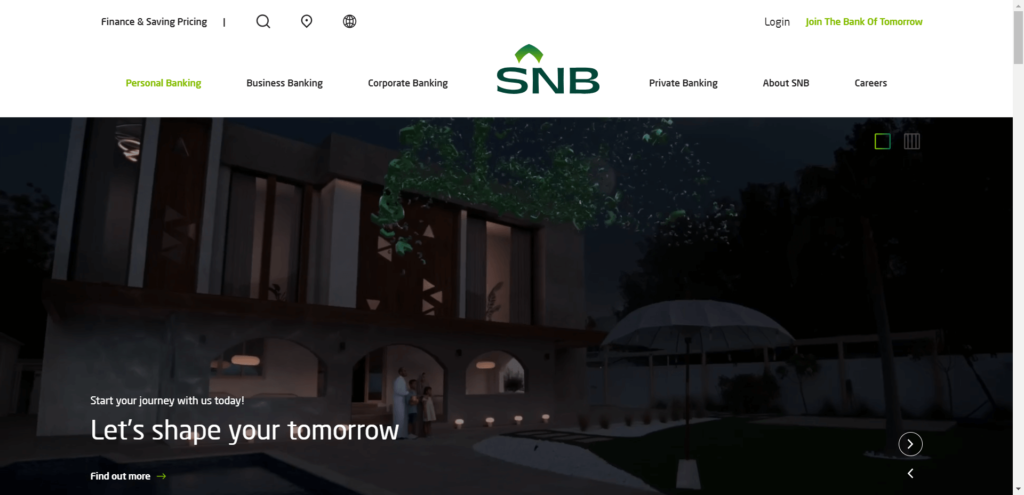
- Assets: $243.8 billion
- CEO: Saeed Al-Ghamdi
- Market Value: $79.3 billion
The Saudi National Bank is the largest commercial bank in Saudi Arabia. Formed by the merger of National Commercial Bank and Samba Financial Group, SNB controls a major portion of the country’s financial assets. It boasts over 500 branches and serves more than 11 million customers. SNB is a key player in the asset management sector, with SNB Capital managing over $67 billion in assets. In 2022, SNB reported a net profit surge of 18.7%, underscoring its position as the top bank in the country.
Official Website: Saudi National Bank (SNB)
2. Al Rajhi Bank

- Assets: $102.18 billion
- CEO: Waleed Al Mogbel
- Market Value: $90.7 billion
Founded in 1957, Al Rajhi Bank is not only the second-largest lender in Saudi Arabia but also the world’s largest Islamic bank by capital. It has over 521 branches in the country and a large customer base of more than 12 million people. Al Rajhi Bank has been instrumental in advancing Islamic finance globally, and it continues to grow by focusing on consumer finance, mortgages, and corporate banking.
Official Website: Al Rajhi Bank
3. Riyad Bank

- Assets: $86.9 billion
- CEO: Tareq Al Sadhan
- Market Value: $27 billion
Riyad Bank is one of the oldest publicly held banks in Saudi Arabia, established in 1957. It has more than 340 branches across the country and operates internationally, with a branch in the UK and an office in Singapore. The bank’s profitability has grown steadily, driven by an increased focus on corporate finance and investment banking services.
Official Website: Riyad Bank
4. Saudi British Bank (SABB)
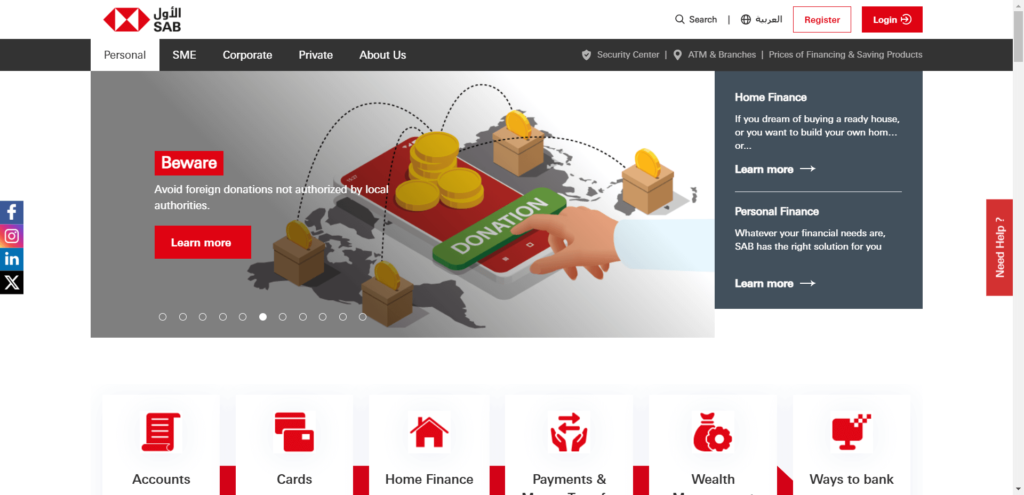
- Assets: $79.3 billion
- CEO: Tony Cripps
- Market Value: $21.8 billion
Saudi British Bank, established in 1978, is affiliated with HSBC Holdings Plc. The bank offers a wide range of services, including private banking, commercial lending, and Islamic banking. In recent years, SABB has focused on growing its ESG (Environmental, Social, and Governance) portfolio, aiming to increase green lending and investments.
Official Website: Saudi British Bank (SABB)
5. Banque Saudi Fransi
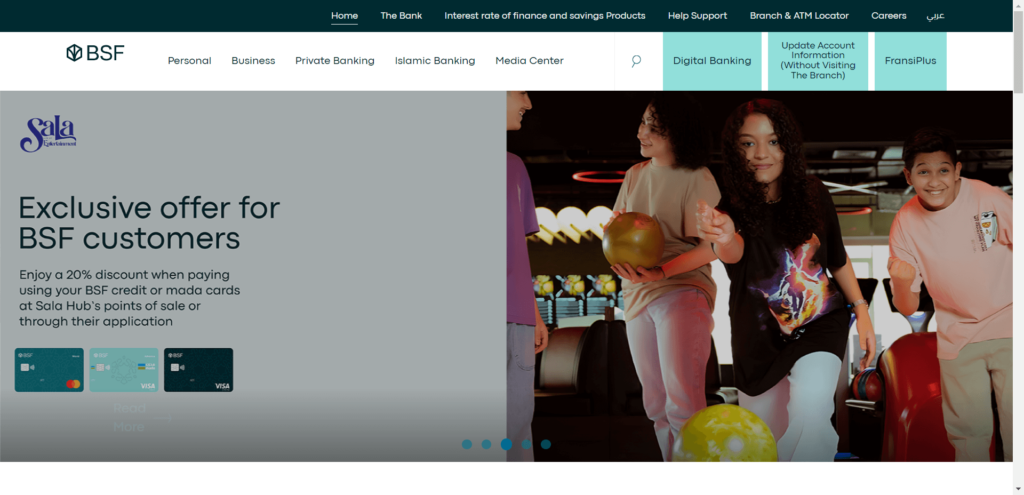
- Assets: $66.5 billion
- CEO: Bader Hamad Alsalloom
- Market Value: $15.4 billion
Banque Saudi Fransi was established in 1977 and is affiliated with Credit Agricole, France’s second-largest bank. The bank serves corporate, retail, and investment banking clients, with a focus on asset management through its subsidiary Saudi Fransi Capital. It has grown its profits significantly by expanding into new markets and focusing on digital services.
Official Website: Banque Saudi Fransi
6. Alinma Bank
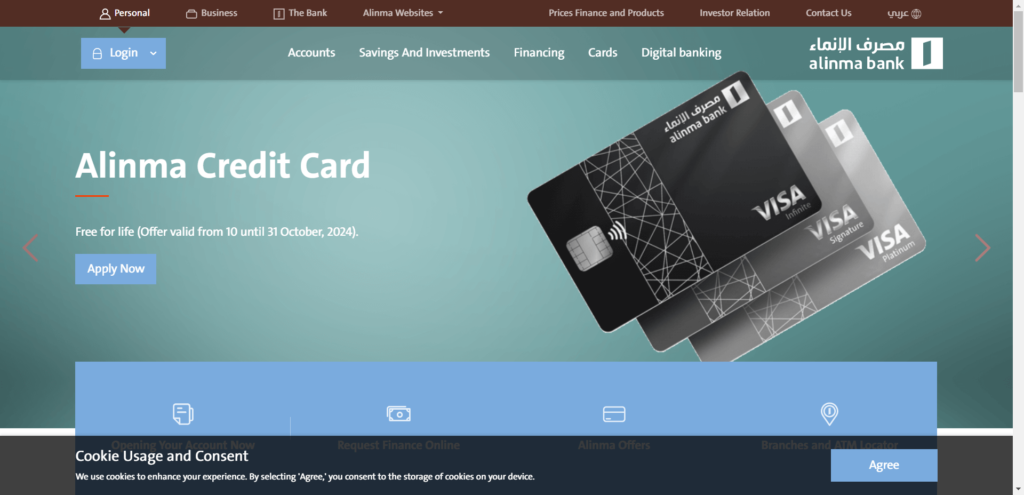
- Assets: $51 billion
- CEO: Abdullah bin Ali AlKhalifa
- Market Value: $17.8 billion
Alinma Bank, established in 2006, is a relatively new player in the Saudi banking sector but has quickly risen to become one of the Top Banks in Saudi Arabia. The bank is renowned for its strong focus on Shariah-compliant banking services, offering a range of retail, corporate, and investment banking solutions. Through its commitment to innovation and digital banking, Alinma has rapidly attracted a growing customer base, positioning itself as a leader among the Top Banks in Saudi Arabia in terms of both customer experience and financial services.
Official Website: Alinma Bank
7. Arab National Bank

- Assets: $49 billion
- CEO: Obaid A Alrasheed
- Market Value: $13 billion
Arab National Bank (ANB) has been a staple of Saudi banking since 1979. With a wide array of services catering to both individuals and corporate clients, ANB has steadily grown its assets and market share. It has a strong presence in the mortgage and consumer finance segments, both of which have contributed to its robust profitability.
Official Website: Arab National Bank
8. Bank Albilad

- Assets: $44 billion
- CEO: Abdulaziz Al-Onaizan
- Market Value: $11.9 billion
Bank Albilad, founded in 2004, is one of the Top Banks in Saudi Arabia, specializing in Islamic banking products. The bank has experienced rapid growth, expanding to over 150 branches and enhancing its remittance services through its subsidiary, Enjaz Payment Services Company. Bank Albilad’s impressive profit growth is driven by the increasing demand for retail banking services, solidifying its position among the leading financial institutions in the country.
Official Website: Bank Albilad
9. The Saudi Investment Bank (SAIB)
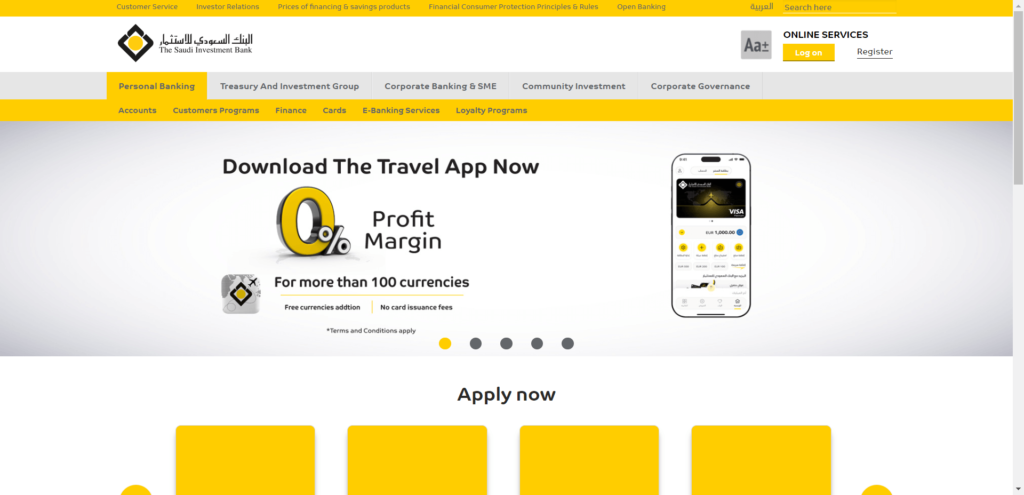
- Assets: $36.7 billion
- CEO: Faisal Abdullah Al-Omran
- Market Value: $5.3 billion
SAIB (Saudi Investment Bank), founded in 1976, is one of the Top Banks in Saudi Arabia, offering a diverse range of services, including trade finance and investment banking. The bank has earned a strong reputation for financing quasi-government projects and supporting the private industrial sector. Additionally, SAIB has expanded its retail services, contributing to steady growth in profits, solidifying its position as a key player in the Saudi financial landscape.
Official Website: The Saudi Investment Bank (SAIB)
10. Bank Aljazira
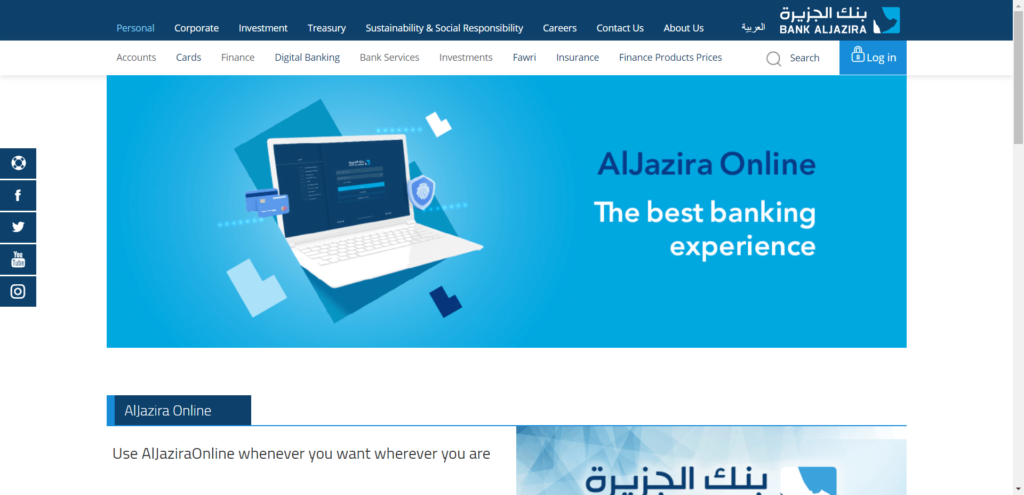
- Assets: $33 billion
- CEO: Naif Al AbdulKareem
- Market Value: $5 billion
Bank Aljazira, established in 1975, is one of the top banks in Saudi Arabia, offering a broad spectrum of Shariah-compliant banking products and services. The bank has successfully expanded its customer base by focusing on SME financing, Islamic banking products, and digital banking solutions, solidifying its position as a key player in the country’s banking sector.
Official Website: Bank Aljazira
Conclusion
The Top Banks in Saudi Arabia are integral to the country’s financial system, acting as major drivers of economic growth. As Saudi Arabia continues its efforts to diversify its economy and reduce its dependence on oil, these banks are set to play an even more crucial role in financing new ventures, particularly within the private sector. With a growing focus on digital infrastructure, expansion into global markets, and a firm commitment to Islamic finance, the Top Banks in Saudi Arabia are well-positioned for sustained growth and innovation in the years ahead. Their role in supporting the Vision 2030 initiatives further solidifies their importance in shaping the Kingdom’s future economic landscape.
Disclaimer:
The list of entities provided here is intended for informational purposes only and does not constitute a recommendation, endorsement, or advice. We make no representations or warranties regarding the accuracy, reliability, or completeness of the information. Readers are strongly encouraged to perform their own research and due diligence before making any decisions related to these organizations. This list is a generic compilation and is not associated with Cosmopolitan The Daily Business Awards or its award winners. We assume no responsibility or liability for any outcomes resulting from actions taken based on this information, including, but not limited to, financial or contractual commitments.